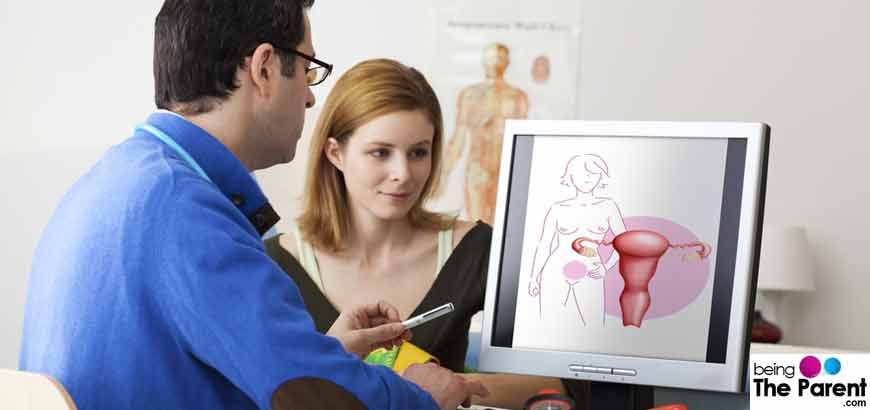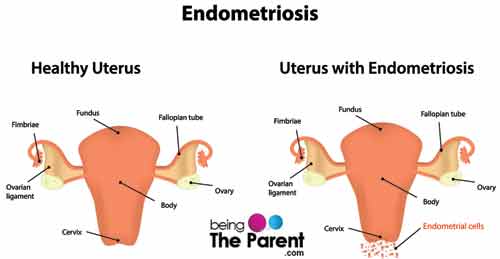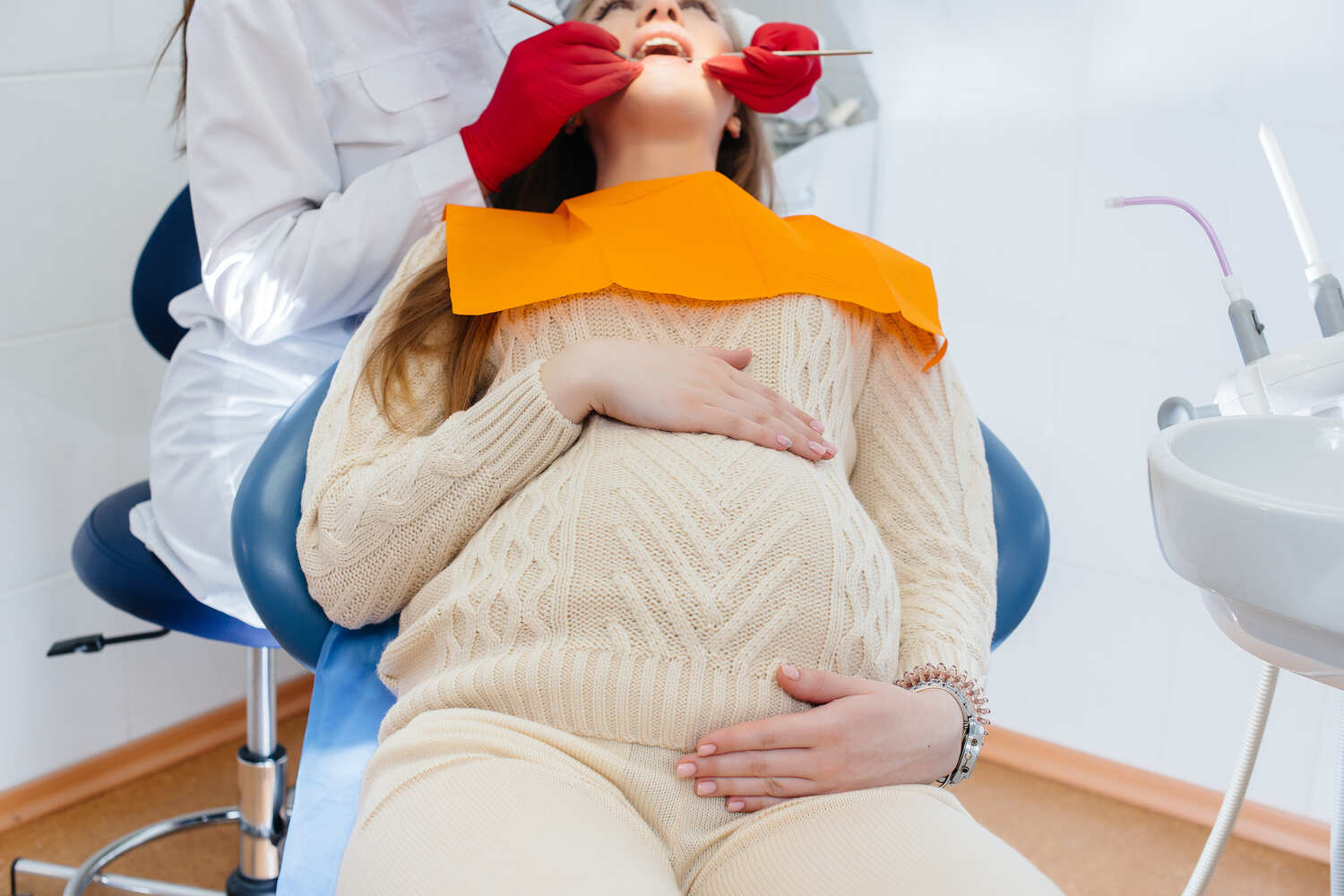
Fallopian Tube Cysts During Pregnancy
4 min readWritten by Editorial Team

 The fallopian tubes and ovaries are parts of the female reproductive system. Fallopian tubes, also referred to as uterine tubes or oviducts are approximately 3-4 inches long, and are found in the pelvic cavity between the uterus and the ovaries. These are a pair, and are present in every woman.
The fallopian tubes and ovaries are parts of the female reproductive system. Fallopian tubes, also referred to as uterine tubes or oviducts are approximately 3-4 inches long, and are found in the pelvic cavity between the uterus and the ovaries. These are a pair, and are present in every woman.
- What Causes A Fallopian Tube Cyst?
- Symptoms of Fallopian Tube Cysts:
- When You Are Detected With A Fallopian Tube Cyst During Pregnancy:
What Causes A Fallopian Tube Cyst?
Many women report fallopian tube cysts. Generally, these are associated with a condition called endometriosis. The lining of your uterus is known as endometrium. Sometimes, it can extend outside the uterus and attaches itself to other reproductive organs. The uterine lining thickens itself when a woman is ovulating, preparing the womb for conception. In the absence of fertilization, the endometrium thins itself to shed the lining – and results in the menstrual flow during periods. However, sometimes, when the endometrium begins to shed at the time of your period, it may not lead into a discharge, being outside the uterus. This results in the formation of a cyst in the  fallopian tube.
fallopian tube.
An undeveloped egg in the uterus may also take the form of a cyst (before disappearing on it’s own). This is called a paraovarian cyst. It is quite a common phenomenon in the 30 – 40 age group. Placing intrauterine contraceptive devices in the oviduct can scar its tissues and result in the formation of cysts. Infections in the cervix blocking the fallopian tubes can also be a reason. The cyst can be an impediment to being pregnant, but not always. In fact, women who have one of their tubes removed due to a cancerous cysts are still able to conceive by virtue of the other tube.
Symptoms of Fallopian Tube Cysts:
Symptoms may include:
• Brown discharges due to old blood.
• Pain in the abdominal region.
• Irregular Menstrual Cycle.
• Unusual bleeding, which comes and goes.
It can also lead to problems in conceiving, so consult a good doctor. There is no need to worry though, because once diagnosed, it can be cured with apt treatment.
When You Are Detected With A Fallopian Tube Cyst During Pregnancy:
In case, you are pregnant, and the ultrasonogram shows a cyst, do not panic. These are easily removable by a laparoscopic surgery. Sometimes, the doctor removes the cyst during the c-section delivery. In highly critical (and rare) conditions, the cyst can be cancerous. The doctor will conduct all sorts of tests to diagnose your problem.
Always remember that the presence of the cyst itself is not a sign of an alarm for you or the baby. The doctor will be the best person to comfort you. Obviously, you need to find a non-alarmist specialist! Unfortunately, many doctors have a tendency to alarm the patient. Finding a good doctor is one of the most important aspects of bearing the heavy responsibility of pregnancy. Do not hesitate to change specialists if you feel any disconnect or are not satisfied with the proceedings. In any case, it is always a good idea to have a second opinion from another doctor.
Experienced doctors usually do not tend to interfere with the cyst in a pregnant woman unless it is seriously threatening. Expectant mothers should be very alert on noting the symptoms of the cyst. Is it too painful? Are there discharges? What is the color of the discharge? Although the body is not supposed to have periods during pregnancy, yet discharges do happen due to a multitude of reasons. Usually, it is not a cause to worry at all!
• Have patience and hope for the best. It is very important to stay calm because your sense of stress can create hormonal disturbances in the body.
• Avoid resorting to alcohol for comfort entirely! Limit smoking to the minimum.
• Also, keep your immune system strong. Take folate supplements daily and eat a lot of fresh fruits. Include veggies as juices or dishes in your diet.
• Stay hydrated with plenty of water.
You will do just fine! The cyst may disappear by itself. Obviously, the surgeon will gently remove the cyst when it is very serious (in extremely rare conditions). Many women also worry their fallopian tubes to be crushed under the weight of the bulging uterus. Do not worry; your body is doing just fine. And no, the expanding uterus does not crush your fallopian tubes!
Do Not Get Alarmed
Do note that there is no general diagnosis of fallopian tube cysts. The body of every woman is unique, and the best strategy is always to follow sound advices from the doctor. Your conditions are unique, but other women also have similar situations. Look up credible online resources (like here) that do not alarm you. You can also assure yourself by sharing your concerns at a pregnancy forum. You will find many other moms discussing the same issues, and your problem may be exactly similar to someone else’s.
Sometimes, polyps or blood clots may also develop which may show the symptoms of a cyst. This is again a quite normal thing during pregnancy. Do not worry the worst from the very beginning. Take your time to find a good specialist, ensure you have a loving ambience at home, and be brave.

Editorial Team,
With a rich experience in pregnancy and parenting, our team of experts create insightful, well-curated, and easy-to-read content for our to-be-parents and parents at all stages of parenting.Read more.
Responses (0)
Want curated content sharply tailored for your exact stage of parenting?
Related articles

Top 500 Modern Baby Boy Names Starting With R

300 Popular Baby Names That Mean Weather With Meanings

Numbness During Pregnancy – Causes And Tips To Deal

Tooth Extraction During Pregnancy – Is It Safe?

HIIT Exercises During Pregnancy – Are They Safe?

Infused Waters During Pregnancy – Benefits and Side Effects
Sponsored content
Discover great local businesses around you for your kids.
Get regular updates, great recommendations and other right stuff at the right time.





